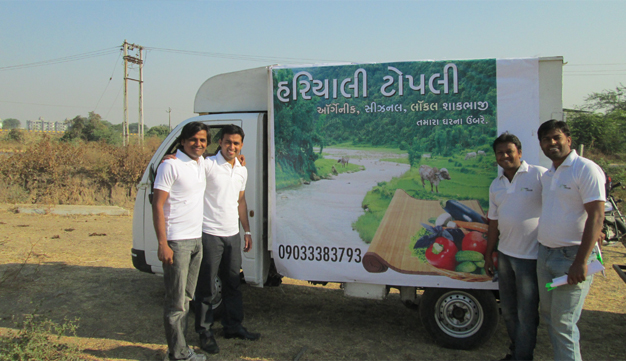Increasing awareness among consumers of the health benefits, coupled with rising disposable incomes, is making organic vegetables and fruits the preferred choice across many Indian kitchens. Organic products, which until now were mainly being exported, are now finding more consumers in the domestic market. Although health is the key reason for growing demand, other incidental benefits such as better taste and being environment friendly are also driving growth. Not only is it a win-win for consumers but also for the growers of organic products as the returns are also much higher.

For Nareshbhai, a farmer from Boriyavi village near Vadodara in Gujarat, agriculture was all about growing grains, pulses and vegetables with inputs like pesticides, and fertilizers. In 2013, he came to know about Krishi Naturals and met its team, including founder Ketan Parmar and understood the damage being done by chemical pesticides led farming. An awareness campaign through audio visual tools and sharing of successful case studies by the team from Krishi Naturals exposed Nareshbhai to farming of a different kind - the organic way. Krishi Naturals not only provided training on various techniques of organic farming, manufacturing of nutritious organic inputs, and post harvesting management but also helped Nareshbhai get a good price for his produce.
In rural India, many Nareshbhais are now realizing the benefits of organic farming. While organic farming is still in its infancy in India, various estimates point towards its growing potential in India. According to industry association ASSOCHAM, the current market for organic foods in India is pegged at Rs 2,500 crore, and is expected to reach Rs 6,000 crore by 2015.
Many social venture start-ups like Krishi Naturals need a strong support system to be sustainable and for Ketan help came from DBS Bank. Ketan is an alumnus of TISS, and one of the 21 ventures that DBS – TISS program supported.
Launched in 2012 the DBS – TISS program has partnered with some high potential ventures, ranging from supplying drinking water in Sikar district in Rajasthan to another that generates bio-gas from urban waste in Mumbai to educating the students in rural India. Championing social entrepreneurship across the region has been the centerpiece of our social responsibility efforts. Working with TATA Institute of Social Sciences (TISS), DBS established programmes to help provide start-up funding, business guidance as well as mentoring support. DBS believes that the ventures will bring about social change and through these initiatives, we seek to empower social enterprises to become commercially viable while pursuing their social objectives.
Ketan and his team believe they have just penetrated a minuscule portion of this huge market opportunity. A post graduate from Mumbai-based Tata Institute of Social Sciences (TISS), the idea of working in the social enterprise space was quite clear in his mind and heart even before he applied for the master’s course. Having worked in the area of preservation and improvement in genetic quality of indigenous cows, Ketan “wanted to do something that has a substantial impact on the social ecosystem”. His mission: Providing sustainable livelihood source to marginal farmers by promoting organic farming among them and providing market linkages for organic products.
Buoyed by the success of a pilot project in Gujarat, Krishi Naturals has mobilized over 800 farmers to undertake organic farming and aims at reaching 5000 farmers in the next four years.
Krishi Naturals way of working with its target audiences are simple. On one hand, it engages closely with farmers by disseminating advice on best practices for organic farming and providing technical support. While doing this, the bigger challenge is the perception about organic farming being considered far less productive than the traditional method of agriculture using chemical inputs. Farmers who evince interest are organized into a co-operative. What makes Krishi Naturals business model unique is that, it also provides market linkages for the organic products grown by the farmers. In other words, on the supply side it ensures the farmers a guaranteed market and on the demand side the venture has reached out to housing societies in Baroda and provides weekly baskets of fresh organic produce to the residents.
This distribution model, based on seasonal subscriptions, provides farmers with a stable, predictable income and ensures that only crops that can be guaranteed to be sold will be grown, reducing food wastage. These advanced subscriptions also provide much-needed working capital.
While organic farming is still in its infancy in India, various estimates point towards it growing acceptance amongst both farmers and consumers. DBS believes that organic farming should be enthusiastically greeted and it will not only strengthen the economy but will also reduce the carbon foot print. Krishi Naturals is truly spearheading a green revolution of a different sort.
Sharing Ketan’s story with you, we bring to you Portraits of Purpose.